
![]()
![]()
Do-It-Yourself information for the modifications I've completed
![]()
Do-It-Yourself information for essential wear and tear items
![]()
Articles covering all the ways to maintain your car
![]()
All about the BMW 330ci
![]()
Various links that I've found valuable
![]()
A few pictures of my car and some others
UUC SwayBarbarian Sway Bar Install
Warning!
The information provided at "Bmw330ci.net" web site is "as is" with all faults and without warranty of any kind, expressed or implied, including those of merchantability and fitness for a particular purpose, or arising from a course of dealing, usage or trade practice. "Bmw330ci.net" web site nor it's owner/creator, can not and does not provide any warranty, expressed or implied, about the accuracy or use of information found on "Bmw330ci.net" web site. The user assumes that risk.
THE USE OF THIS INFORMATION IS FOR YOUR REFERENCE ONLY. BMW330CI.NET AND ITS OWNER/CREATOR DISCLAIM ALL LIABILITY FOR DIRECT, INDIRECT, INCIDENTAL, OR CONSEQUENTIAL DAMAGES OR INJURIES THAT RESULT FROM ANY USE OF THE EXAMPLES, INSTRUCTIONS OR OTHER INFORMATION ON THIS PAGE.
Why upgrade your sway bars?
If you've ever taken a corner quickly, you will immediately notice there is body roll in the car. On the simplest level sway bars reduce body roll or sway and allow you to handle much better. Even further, adjustable sway bars allow you to fine tune your under steer and over steer (back end out) to your personal preferences. If you're a car enthusiast, this is a must do modification that will continually put a smile on your face!
Difficulty
This is a fairly easy do it yourself if you're on a lift, but if you're using jack stands, then it will be a little bit more time consuming and painful (I did it, so you can do it too). It's really just removing bolts and adjusting everything properly. You can definitely do this modification yourself, and I highly recommend you do it. If you can get access to a lift for this job, Do It!
Parts Needed
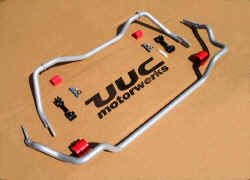
UUC SwayBarbarian Sway Bars $350 (This will come with everything you need in order to complete the installation)
White Lithium Grease
Plumbers Teflon Tape
Tools Needed
Floor Jack (A high lift SUV jack will make the job much easier)
Jack Stands (If you are not using a lift)
Torque Wrench (10-100 ft-lbs range will be sufficient)
Various Sockets and Hand Wrenches
Screwdrivers
Pliers
Instructions
Safely lift the car and remove the wheels
1. Using a lift or a floor jack with jackstands lift the car. Instructions for jacking up your car can be found here. This can be a very dangerous step, so make sure that the car is properly secured before ever getting under it. Never get under a car that is just supported by a jack!
2. Using a 17mm deep socket with an impact wrench or hand ratchet, remove the lugnuts on the rear wheels and set your wheels aside. If your alloys are seized onto your brake rotors, sit down on your but and give the sidewalls of the tires a good kick until it has become unloosened. If they have seized on, make yourself a note to add some anti-seize lubricant to the brake rotors before installing the wheels.
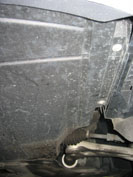 Front splash shield |
Remove the front splash shield |
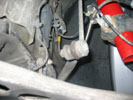 Sway Bar Endlink |
Unattach the sway bar endlink |
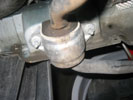 Sway bar bushing bolts |
Remove the bushing bolts |
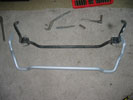 Difference in sway bars 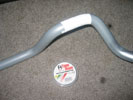 Plumbers tape on the sway bar 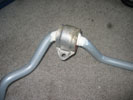 Greased bushing back on the bar |
Grease and tape the new front sway bar |
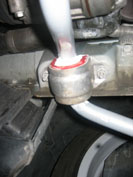 Installed front bushing 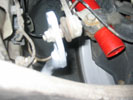 Endlink reattached |
Reinstall the front swaybar |
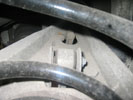 Rear sway bar endlink |
Unbolt the rear sway bar endlink and undo the sway bar bushing bolt |
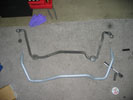 Old and new rear sway bars |
Remove, tape, and grease the new rear sway bar |
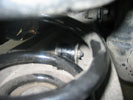 Reattach the rear endlinks 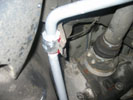 Reinstall the rear bushings 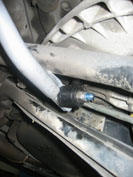 Unloaded sway bar position 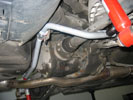 Finished rear sway bar |
Install the new rear sway bar |
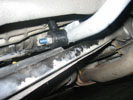 Properly aligned endlink |
Make sure that the rear sway bar is properly aligned |
Review and Conclusions
After completing the install the first thing I noticed was practically zero body roll. In many respects, this modification is dangerous, because it makes you want to push the limits of the car. I highly recommend adding some new sway bars if you're even slightly thinking about it. When it is installed properly, it makes no extra noise and makes your car seem like a new, better road handling machine! These sway bars definitely blow your mind away!
Disclaimer
All product manufacturer logos are property of their respective manufacturer.